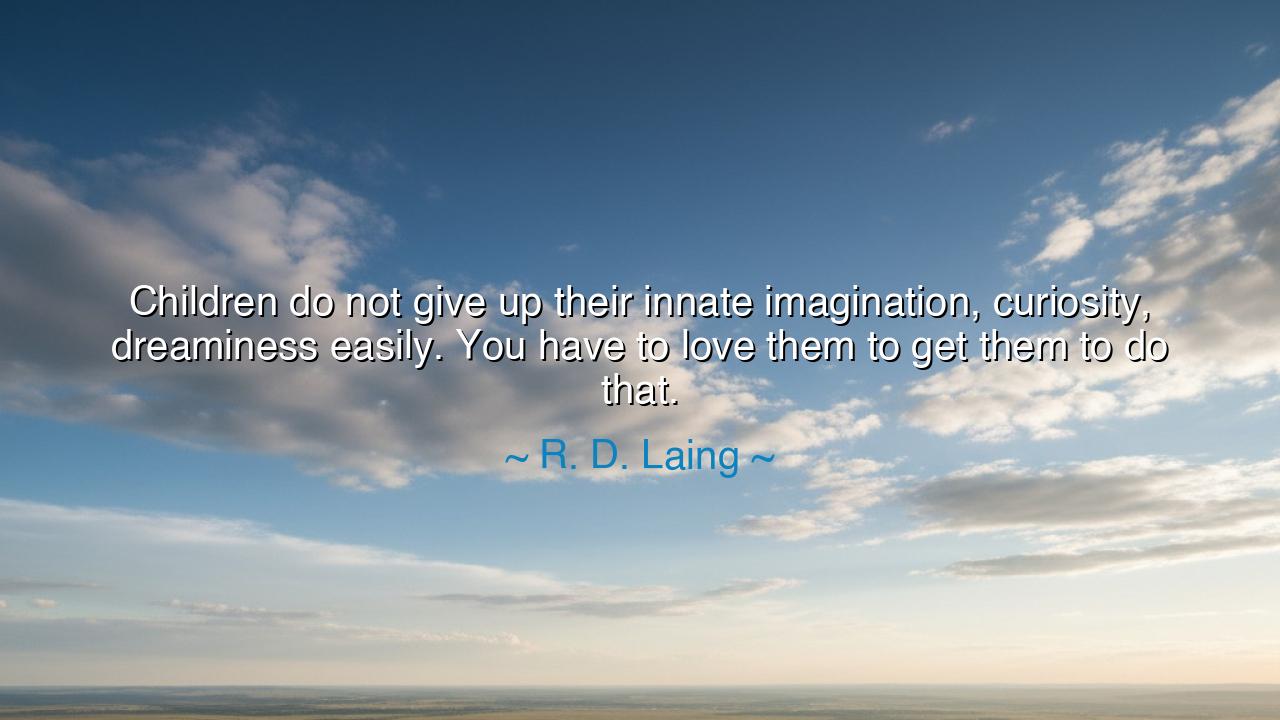
Children do not give up their innate imagination, curiosity
Children do not give up their innate imagination, curiosity, dreaminess easily. You have to love them to get them to do that.






Ah, gather close, O children of the earth, for in the words of R. D. Laing there lies a profound and tender truth about the nature of childhood, imagination, and the deep bond between parent and child: "Children do not give up their innate imagination, curiosity, dreaminess easily. You have to love them to get them to do that." These words speak not just to the ways in which children are shaped by the world, but to the deep, sacred relationship that exists between the nurturer and the nurtured, between the one who loves and the one who is loved. Laing reminds us that the imagination of a child is not something to be easily extinguished or coerced, but something that must be gently nurtured and protected.
In the ancient world, the imagination was seen as a divine gift, a spark of the divine within the human soul. Plato spoke of the Forms, the eternal truths that exist in the realm of the mind, accessible only through the power of imagination. For the child, the world was filled with these forms—unseen, unspoken truths that they could feel but could not yet fully articulate. The child's imagination is not a mere fantasy, but a bridge to a world of deeper understanding, a world where dreams and curiosity lead to the discovery of great truths. Laing's words speak to this sacred and powerful aspect of childhood, where the imagination is not a triviality, but the foundation upon which all future wisdom is built.
Consider the early philosophers and poets who looked to the child's mind as a source of inspiration. Socrates, for example, believed that true wisdom came not from rigid study, but from the freedom of thought and questioning that was most vibrant in youth. It was through the curiosity and wonder of a child that one could ask the questions that led to the most profound discoveries. The child’s imagination, unburdened by the weight of the world, is capable of seeing things that the adult mind can no longer perceive. This is why Socrates so often engaged with the youth of Athens, for they had the power to see the world with fresh eyes, untainted by the constraints of formal knowledge.
But Laing reminds us that this innate imagination is not to be easily crushed. The world, with its demands for conformity, study, and productivity, often seeks to extinguish the very spirit of dreaminess that drives the child. We, as parents, teachers, and guides, must recognize that to love a child is to protect this sacred spark within them, to shield it from the forces of the world that seek to harden the soft, malleable soul. Love, in this context, is not just affection but a deep, nurturing force that allows the child to grow, to explore, to dream, and to remain connected to that eternal well of curiosity that exists within them.
Let us look to the story of Leonardo da Vinci, whose curiosity and imagination were nurtured from a young age. Though he was born to humble beginnings, Leonardo’s mind was free to explore. His father, recognizing the brilliance in his son, encouraged his wild imaginings and supported his ventures into art, science, and invention. It was this early nurturing of curiosity that allowed Leonardo to see the world in ways no one else had seen before. His imagination led him to inventions centuries ahead of their time, to works of art that still move the world today. Da Vinci’s story shows us how important it is to love and nurture the child’s imagination, for it is from this love that true creativity and greatness arise.
In the same way, O children of the future, we must nurture the imagination of those who come after us. Do not be quick to dismiss the dreaminess or the curiosity of the child, for in those qualities lies the potential for great discovery. To love a child is not merely to provide for their needs but to honor their innate ability to see the world in new and profound ways. Let them ask their questions, let them explore their dreams, for it is through this imagination that the seeds of wisdom, invention, and growth are planted.
So, O seekers of wisdom, take heed of Laing’s wisdom and remember that the imagination of the child is not a fleeting fancy but a divine gift. It is through the nurturing of this gift with love, patience, and encouragement that the child will grow into the great thinkers, creators, and leaders of tomorrow. Do not seek to extinguish their curiosity in favor of cold, rigid structures, but instead, allow them the space to grow, to dream, to imagine. For in that freedom, they will find the truths of the world and will go on to shape the future in ways that we cannot yet imagine.






AAdministratorAdministrator
Welcome, honored guests. Please leave a comment, we will respond soon